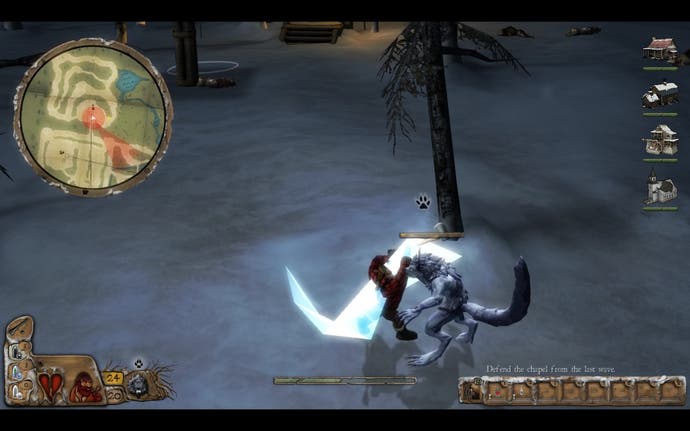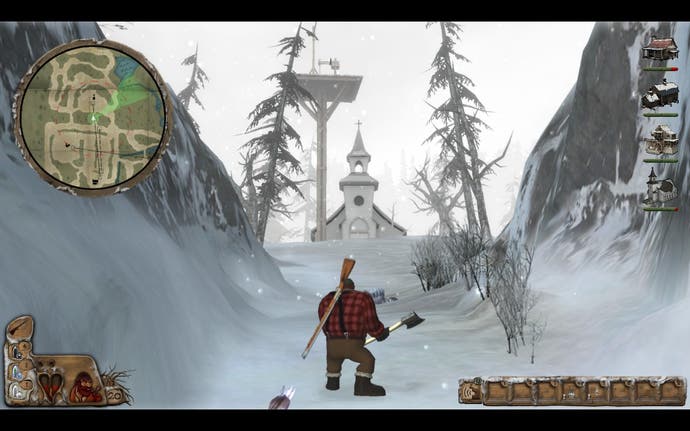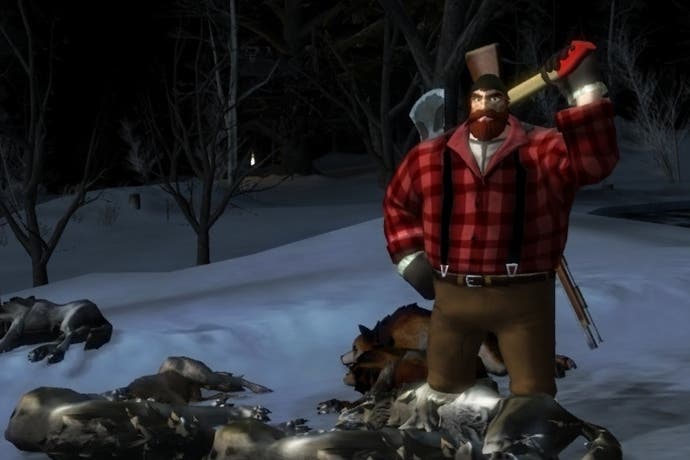Games of 2013: Sang-Froid: Tales of Werewolves
The wilderness will not let it go.
I read a book in between levels of Sang-Froid. Not a long book, granted, but it's not a particularly long game. It is an incredibly exhausting game, though, and that's where the book came in. I needed a breather to break up the periods of vile punishment. I needed time off before heading back out there. For an adventure that trades so heavily in its oppressive atmosphere, that's got to be a good sign, right?
Sang-Froid's a game about killing werewolves. In this respect, it's not the first of its kind. There have been other games where you're dispatched to kill werewolves, and they generally give you tools and powers that are up to the job. They'll dress you as Van Helsing or a scowling equivalent. They'll spend the opening cut-scene telling everyone what a werewolf-killing savant you are. After that, the first actual level will load you down with heavy artillery and see you pulping everything that comes your way. Killing werewolves, you will quickly come to realise, is a bit like killing anything else in a video game. It's no big deal.
Not so Sang-Froid. Sang-Froid casts you as a knackered-out Canadian lumberjack in the 1850s, and most of the tools and powers you have are the tools and powers a knackered-out Canadian lumberjack in the 1850s might reasonably come with. You've got an axe, but it's a nightmare to swing around with any accuracy. You've got a rifle, but it takes an age to load. The werewolves strip your life away in broad, flesh-rending swipes, and even the gentlest jog through the snow will see you doubled up and heaving afterwards. The health potions are generally rustic moonshine that was probably made in some unfortunate's bathroom, and the cooldowns are an absolute killer. The right mouse button's shoot. The left mouse button's cough.
I made that last bit up, but the point still stands: Sang-Froid's selling you the peculiar fantasy of disempowerment. It's pushing you deep into the woods, into a strange time and an unfamiliar culture, and in its blend of tower-defense strategising and wolf-clubbing tactical battling, it's stacking the odds against you from the off. It's an assault on your willpower, on your intellectual energy, even. It's an assault on your humanity, as your aggressors track you by your scent and are far better equipped for the frost and the icy drifts. In other words, it's completely wonderful. Have you played it yet? You must.
That's the thing. Somewhere in the midst of those time-outs, in the moments between failing a level at the last second and deciding I could just about face the prospect of having another go, I grew to love this strange, unwieldy game. I grew to first understand the simple tools at my disposal, and then I grew to cherish them. I honed plans, planted traps, and slowly weaned myself off a debilitating over-reliance on supplies and tonics. By the end of it all, whenever the wolves started to approach, whenever I could hear their distant cries on the wind or see dark eyes glittering from the far side of a bonfire, I started to grin. I started to feel sorry for them.

Why do some games wear you down? For me, I suspect it has a lot to do with expectations - and I mean their expectations, not mine. The games that really grind me to dust are the ones that are so badly made they don't even know how unbalanced they are. Oh, they'll say after you've failed an escort mission - always an escort mission - for the millionth time, having a spot of bother on the regular difficulty setting? They don't realise that a greater level of difficulty is meant to translate into a greater level of pleasure. Or maybe they don't recognise that you can be difficult without being entertaining, and that this is a failure of design.
Sang-Froid knows exactly what it's doing, though. It knows what an awful bastard it is, and it really sells that to you. This was never going to be easy, it says, and so, unconsciously, I adjust my patience accordingly. Each victory is rich and unexpected. Each defeat is purely part of the learning process. I get better over time because I'm engaged with the fiction and the fiction is engaged with the mechanics. I get better over time because there's something worthwhile to learn.
There's lots to learn, actually, and despite the rather hand-made delivery, this is a very tidy sort of game that presents its ideas with economy and elegance - so as to give additional emphasis, perhaps, to the moment that babbling, bloodthirsty chaos erupts on the battlefield. Every day, you plot, studying the waves of unspeakable fiends you're going to face that evening, tracing their approaches on an overhead map of your small farmstead, and laying traps to whittle away at their numbers. See how cleanly the elements mesh, how you can trade action points for cash by cutting lumber. See how each level has a secret waiting to be exploited - two waves that cross a single crucial choke-point at different times, or three mobs that converge on a lone target, leaving distant stragglers isolated and vulnerable.

It's a calm game from this vantage point - a cerebral game of vectors and timings. Each night is a rude awakening, then, as you're thrust down into the map itself, into a dark 3D world of ravaging winds and distant screams. You had a plan for all this, but how did you ever think it would work? Where are you meant to be going? Where are you meant to start?
Few games create such a jarring sensation as you switch between modes. Few games rub chilly strategy against warm-blooded violence with such gloating enthusiasm. And, yes, even fewer eventually teach you how to win out over the various hardships that have been piled upon you. Disempowerment! Few games (Dark Souls, the Stalker series) bring you so low and make it feel so glorious - and by turn transform mastery into such a tangible achievement.
That's Sang-Froid through and through, though: an unpopular theme handled in a relentless and unforgiving manner, a wild game slotted in amongst the polite, the ingratiating, the over-produced. I've played hundreds of great games this year, and, yes, some of them have been better than Sang-Froid, whatever better may actually mean here. None of them have offered the same emotional highs and lows, though. None of them have stayed with me after the campaign's finished and the review is submitted. None of them have refused to budge quite like this one.
There's poetry to it, really. It's just like the poet said, in fact. "I keep this wolf because the wilderness gave it to me and the wilderness will not let it go."




